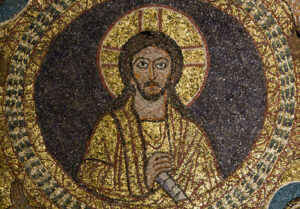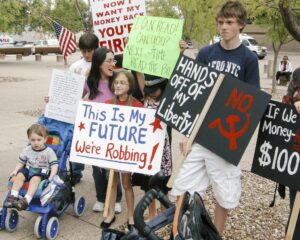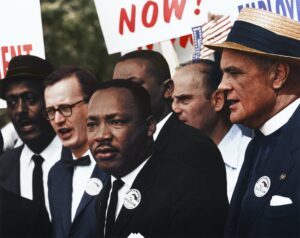A recent Vice article describes the “agonizing choice” made by Bettie Douglas, a McDonald’s employee in St. Louis: “Go in to work and risk exposure to COVID-19, or lose out on a paycheck she needs to support her family.” As a minister living and working in New York City, I have encountered many families in the same bind. Each one has told me some version of the same story: “Either we go into work and risk exposing ourselves and our families to this deadly disease, or we stay home. And if we stay home, how are we going to put food on the table? And how are we going to pay the rent? April is already almost here!”
As a pastor, when I hear these stories, I feel an overwhelming sense of anger, sadness, and impotence. What can I tell a working mother or father faced with such a predicament? If I were faced with such a choice, I imagine that I would make the decision that Bettie made. After all, I am not going to let my family starve or be kicked out on the street. At the same time, how can I in good conscience expose my family to a disease that has proven itself to be lethal?
This dilemma has laid bare the cruelty that Sartre emphasized so many years ago. It is a cruelty that lies at the very heart of capitalism. In a capitalist system, especially in its current, neoliberal iteration, the only way a working family can provide for its basic needs is by working—by sending family members to sell their labor for the price assigned by the market. With the wages earned in that exchange, that family then purchases all of the goods it needs to survive—food, shelter, clothes, medicine, etc. That is why Sartre said that closing a factory is an exercise of the fundamental right to kill—because without work, millions of people literally die.
The cruel twist of this global pandemic is that continuing to work now means risking death. President Trump has conceded that the U.S. could see over 200,000 deaths. By now we have all internalized the bipartisan wisdom that the best way to stay safe is to stay home. And yet, as I write at this moment from the comfort and safety of my home, millions of Americans are going in to work. And if going outside were not dangerous enough already, workers are entering workplaces that are the very breeding grounds for the virus.
On Monday, Amazon workers in Staten Island, N.Y. and Instacart workers across the country walked off their jobs to demand increased protection and pay. Now Whole Foods workers across the nation are also striking in a demand for hazard pay. NPR reports that these same companies are booming right now. “The strikes come as both Amazon and Instacart have said they plan to hire tens of thousands of new workers. Online shopping and grocery home delivery are skyrocketing as much of the nation hunkers down and people stay at home, following orders and recommendations from the federal and local governments.”
Costco, another company central to the survival of many households in this time, has had an “extraordinary” month in terms of sales. The company has not announced any additional paid sick time for its employees, while associates across the country test positive for COVID-19. We are seeing an unprecedented wave of labor activism because workers are increasingly desperate. And no wonder: while some of us hunker in our homes, countless vulnerable workers are forced to literally risk their lives to put food on our tables and grow corporate profits.
This crisis unveils the growing precariousness of the entire working-class over decades and the way that capitalism is built upon racist oppression. In an extraordinary set of statistics, Vice has reported that “among the American workforce, just 16.2% of Hispanic workers and 19.87% of black Americans are able to work from home, while about 30% of whites and 37% of Asian-Americans can.” These figures reveal two disparities at the heart of the U.S. economy. First, the most vulnerable and marginalized of our workforce are disproportionately black and Latinx. The second is that, even among Asian and white workers, the overwhelming majority of those are working-class and therefore vulnerable as well. This is borne out in recent studies which have shown that nearly 50% of Americans currently live paycheck to paycheck. That means that in ordinary circumstances, if a family misses even a handful of paychecks, they will find themselves in financial ruin. During this pandemic, it is not just an unfortunate few who are risking their lives to go to work; it is the vast, working-class majority, and especially people of color.
Meanwhile, the heads of Whole Foods, Amazon, Costco and Instacart are making a killing off the literal killing of the poor. I am reminded here of the apostle James, who wrote:
“Come now, you rich people, weep and wail for the miseries that are coming to you. Your riches have rotted, and your clothes are moth-eaten….You have laid up treasure for the last days. Listen! The wages of the laborers who mowed your fields, which you kept back by fraud, cry out, and the cries of the harvesters have reached the ears of the Lord of hosts. You have lived on the earth in luxury and in pleasure; you have fattened your hearts in a day of slaughter. You have condemned and murdered the righteous one, who does not resist you” (James 5:1-6).
Clearly, the captains of capitalist industry would be the main object of the apostle’s scorn and condemnation.
But there is a larger demographic—mostly professionals, mostly white (but not all)—who will make it through this crisis relatively unscathed. As a pastor in the employ of a financially stable congregation, and as a Chinese-American man from a family of relative privilege and stability, I am fortunate enough to count myself within that 30-37%. Because of the way social media and social circles are structured, a superficial glance outward would tell me that most Americans are in a similar situation. But the truth is, for the majority of Americans, when faced with the bitter choice of going out and risking death at the hands of COVID-19 and staying home to stay safe, most will choose death every time. And they will do so not only to put food on their table, and not only so the captains of industry can get rich and remain powerful; they will do it so that you and I may stay home and stay safe. This is the “sovereignty” that Sartre describes—this “tacit understanding that we have the fundamental right to kill.”
The good news, as Mexican exegete José Porfirio Miranda reminds us, is that we are not doomed to embrace this ideology of death forever. Miranda says, “There is always among people an underlying deviation, a mistrust, a readiness to trample upon the other. This can be increased till it becomes in Sartre’s words, ‘The feeling that we have the fundamental right to kill.’…But, we repeat, this deviation can be eradicated.”
We can abandon our embrace of the right to kill—a sovereignty that lies at the heart of capitalism. By doing so we can choose life. We can choose freedom. We can choose a different way of organizing our society. An organization in which everybody, and not just the privileged few, could stay home and stay safe from the coronavirus. An organization in which it is not just black and brown bodies on the front lines, but in which we all stand or fall together. An organization in which the health and livelihoods of the many are not sacrificed upon the altars of profit and security for the few.
That new way can come about with the simple and yet difficult option of solidarity. Across this country, workers are enacting solidarity by refusing to lay down and take the hand of death they’re being dealt. When widespread strikes come—and they are coming— ask yourself a simple question: whose side are you on?
Rev. Michael Vanacore is an ordained minister in the United Church of Christ and serves as the Associate Minister for Congregational Life at Fort Washington Collegiate Church in New York City. He is a former organizer with the Service Employees International Union (SEIU).
◆ ◆ ◆
Did you appreciate this article? Please consider making a donation to help us continue to build a new voice for the Chistian Left. Click here to donate today.



